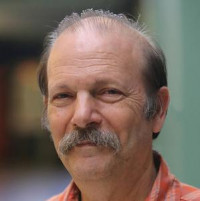World Logic Day Lecture: Moshe Y. Vardi
From Greek Paradoxes to Political Paradoxes
| DATE: | Friday, January 14, 2022 |
| TIME: | 17:00 |
On 14 January 2022, we celebrated the international World Logic Day virtually with the Vienna Center for Logic and Algorithms (VCLA) at TU Wien and the Logic community from the city of Kurt Gödel, Ludwig Wittgenstein, and the Vienna Circle.
UNESCO proclaimed World Logic Day in 2019,in association with the International Council for Philosophy and Human Sciences (CIPSH), to enhance public understanding of logic and its implications for science, technology and innovation. “In the twenty-first century – indeed, now more than ever – the discipline of logic is a particularly timely one, utterly vital to our societies and economies. Computer science and information and communications technology, for example, are rooted in logical and algorithmic reasoning.” — Audrey Azoulay, Director General of UNESCO
The 2022 virtual Vienna World Logic Day Lecture was held by Moshe Y. Vardi (Rice University)

Topic: From Greek Paradoxes to Political Paradoxes
Date: 14 January 2022
Recording: VCLA Youtube Channel.
Abstract
The ancient Greeks invented logic, as a tool to discover eternal truths. They also invented paradoxes, as a tool to sharpen the mind. Famous Greek paradoxes are the Liar’s Paradox, Zeno’s Paradox, and the Sand-Heap Paradox. The Liar’s Paradox led, at the start of the 20th Century, to a foundational crisis of mathematics, which led to the development of computability theory in the 1930s, as well as the unresolvable mathematical conundrum of Gödel’s Incompleteness Theorem.
Computing technology, which also emerged in the 1930s, ultimately led, at the start of the 21 Century, to the emergence of social media. Today, our society is struggling with the adverse societal effects of social media. These adverse effects can also be understood in terms of the Greek paradoxes, as well as their political versions, known as the Popperian Paradoxes. In fact, one can say that the Greek myths of Prometheus and Pandora already told us that technology does not come without adverse consequences, which is why John von Neumann, one of the most prominent computing pioneers, asked in 1955, “Can we survive technology?”
Moshe Y. Vardi
Moshe Y. Vardi is University Professor, Karen Ostrum George Distinguished Service Professor in Computational Engineering at Rice University, where he is leading an Initiative on Technology, Culture, and Society. His interests focus on automated reasoning, a branch of Artificial Intelligence with broad applications to computer science, including machine learning, database theory, computational-complexity theory, knowledge in multi-agent systems, computer-aided verification, and teaching logic across the curriculum. He is also a Faculty Scholar at the Baker Institute for Public Policy at Rice University.
Website
For more information and the recording please visit the website of Vienna World Logic Day at: https://logicday.vcla.at/
